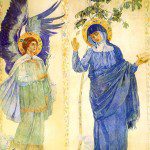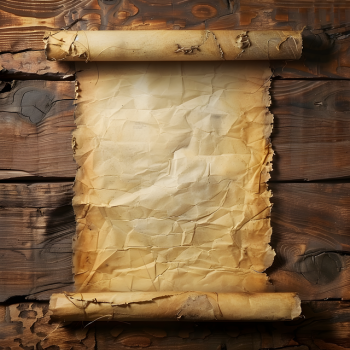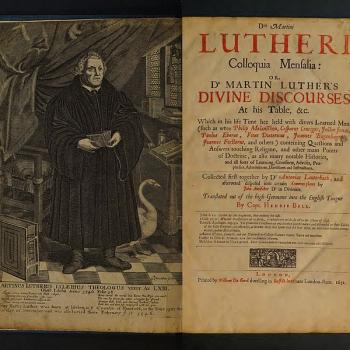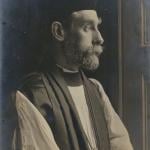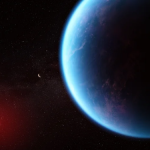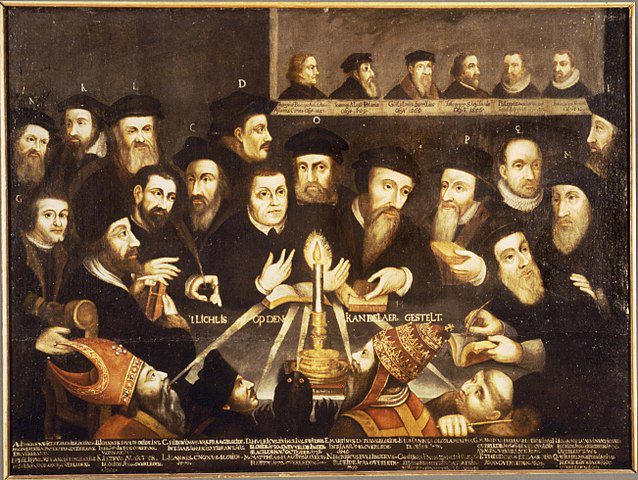
All of the early Protestant Founders accepted the truth of the perpetual virginity of Mary. How could this be, if it is merely “tradition” with no scriptural basis? Why was its supposed violation of Scripture not so obvious to them, as it is to the Protestants of the last 150 years or so (since the onset of theological liberalism) who have ditched this previously held opinion? Yet it has become fashionable to believe that Jesus had blood brothers (I suspect, because this contradicts Catholic teaching), contrary to the original consensus of the early Protestants.
Let’s see what the founders of Protestantism taught about this doctrine. If Catholics are so entrenched in what has been described as “silly,” “desperate,” “obviously false,” “unbiblical tradition” here, then so are many Protestant luminaries such as Luther, Calvin, and Wesley. Strangely enough, however, current-day Protestant critics of Catholicism rarely aim criticism at them. I guess the same “errors” are egregious to a different degree, depending on who accepts and promulgates them — sort of like the Orwellian proverb from Animal Farm: “all people are equal, but some are more equal than others.”
General
Whatever may be the position theologically that one may take today on the subject of Mariology, one is not able to call to one’s aid ‘reformed tradition’ unless one does it with the greatest care . . . the Marian doctrine of the Reformers is consonant with the great tradition of the Church in all the essentials and with that of the Fathers of the first centuries in particular . . . . .
In regard to the Marian doctrine of the Reformers, we have already seen how unanimous they are in all that concerns Mary’s holiness and perpetual virginity . . . (Max Thurian [Protestant], Mary: Mother of all Christians, translated by Neville B. Cryer, New York: Herder & Herder, 1963, 77, 197)
The title ‘Ever Virgin’ (aeiparthenos, semper virgo) arose early in Christianity . . . It was a stock phrase in the Middle Ages and continued to be used in Protestant confessional writings (Luther, Calvin, Zwingli, Andrewes; Book of Concord [1580], Schmalkaldic Articles [1537]). (Raymond E. Brown et al, editors, Mary in the New Testament, Philadelphia: Fortress Press / New York: Paulist Press, 1978, 65 [a joint Catholic-Protestant effort] )
Mary was formally separated from Protestant worship and prayer in the 16th century; in the 20th century the divorce is complete. Even the singing of the ‘Magnificat’ caused the Puritans to have scruples, and if they gave up the Apostles’ Creed, it was not only because of the offensive adjective ‘Catholic’, but also because of the mention of the Virgin . . . [But] Calvin, like Luther and Zwingli, taught the perpetual virginity of Mary. The early Reformers even applied, though with some reticence, the title Theotokos to Mary . . . Calvin called on his followers to venerate and praise her as the teacher who instructs them in her Son’s commands. (J. A. Ross MacKenzie [Protestant], in Stacpoole, Alberic, editor, Mary’s Place in Christian Dialogue, Wilton, Connecticut.: Morehouse-Barlow, 1982, 35-36)
Martin Luther
Christ, our Savior, was the real and natural fruit of Mary’s virginal womb . . . This was without the cooperation of a man, and she remained a virgin after that. (Luther’s Works, editors. Jaroslav Pelikan [vols. 1-30] & Helmut T. Lehmann [vols. 31-55], St. Louis: Concordia Pub. House [vols. 1-30]; Philadelphia: Fortress Press [vols. 31-55]), 1955, vol. 22:23 / Sermons on John, chaps. 1-4 [1539] )
Christ . . . was the only Son of Mary, and the Virgin Mary bore no children besides Him . . . I am inclined to agree with those who declare that ‘brothers’ really mean ‘cousins’ here, for Holy Writ and the Jews always call cousins brothers. (Pelikan, ibid., vol. 22:214-215 / Sermons on John, chaps. 1-4 [1539] )
A new lie about me is being circulated. I am supposed to have preached and written that Mary, the mother of God, was not a virgin either before or after the birth of Christ . . . (Pelikan, ibid.,vol. 45:199 / That Jesus Christ was Born a Jew [1523] )
Scripture does not say or indicate that she later lost her virginity . . .
When Matthew [1:25] says that Joseph did not know Mary carnally until she had brought forth her son, it does not follow that he knew her subsequently; on the contrary, it means that he never did know her . . . This babble . . . is without justification . . . he has neither noticed nor paid any attention to either Scripture or the common idiom. (Pelikan, ibid., vol. 45:206, 212-213 / That Jesus Christ was Born a Jew [1523] )
Editor Jaroslav Pelikan (Lutheran) adds:
Luther . . . does not even consider the possibility that Mary might have had other children than Jesus. This is consistent with his lifelong acceptance of the idea of the perpetual virginity of Mary. (Pelikan, ibid., vol. 22:214-215)
John Calvin
Helvidius displayed excessive ignorance in concluding that Mary must have had many sons, because Christ’s ‘brothers’ are sometimes mentioned. (Harmony of Matthew, Mark & Luke, sec. 39 [Geneva, 1562], vol. 2 / From Calvin’s Commentaries, translated by William Pringle, Grand Rapids, Michigan: Eerdmans, 1949, 215; on Matthew 13:55)
[On Matt 1:25:] The inference he [Helvidius] drew from it was, that Mary remained a virgin no longer than till her first birth, and that afterwards she had other children by her husband . . . No just and well-grounded inference can be drawn from these words . . . as to what took place after the birth of Christ. He is called ‘first-born’; but it is for the sole purpose of informing us that he was born of a virgin . . . What took place afterwards the historian does not inform us . . . No man will obstinately keep up the argument, except from an extreme fondness for disputation.(Pringle, ibid., vol. I, 107)
Under the word ‘brethren’ the Hebrews include all cousins and other relations, whatever may be the degree of affinity. (Pringle, ibid., vol. I, 283 / Commentary on John, [7:3] )
Huldreich Zwingli
He turns, in September 1522, to a lyrical defense of the perpetual virginity of the mother of Christ . . . To deny that Mary remained ‘inviolata’ before, during and after the birth of her Son, was to doubt the omnipotence of God . . . and it was right and profitable to repeat the angelic greeting – not prayer – ‘Hail Mary’ . . . God esteemed Mary above all creatures, including the saints and angels – it was her purity, innocence and invincible faith that mankind must follow. Prayer, however, must be . . . to God alone . . .’Fidei expositio,’ the last pamphlet from his pen . . . There is a special insistence upon the perpetual virginity of Mary. (G. R. Potter, Zwingli, London: Cambridge Univ. Press, 1976, 88-89, 395 / The Perpetual Virginity of Mary . . ., Sep. 17, 1522)
Zwingli had printed in 1524 a sermon on ‘Mary, ever virgin, mother of God.’ (Thurian, ibid., 76)
I have never thought, still less taught, or declared publicly, anything concerning the subject of the ever Virgin Mary, Mother of our salvation, which could be considered dishonourable, impious, unworthy or evil . . . I believe with all my heart according to the word of holy gospel that this pure virgin bore for us the Son of God and that she remained, in the birth and after it, a pure and unsullied virgin, for eternity. (Thurian, ibid., 76 / same sermon)
Heinrich Bullinger
Bullinger (d. 1575) . . . defends Mary’s perpetual virginity . . . and inveighs against the false Christians who defraud her of her rightful praise: ‘In Mary everything is extraordinary and all the more glorious as it has sprung from pure faith and burning love of God.’ She is ‘the most unique and the noblest member’ of the Christian community . . .
‘The Virgin Mary . . . completely sanctified by the grace and blood of her only Son and abundantly endowed by the gift of the Holy Spirit and preferred to all . . . now lives happily with Christ in heaven and is called and remains ever-Virgin and Mother of God.’ (in Hilda Graef, Mary: A History of Doctrine and Devotion, combined edition of volumes. 1 & 2, London: Sheed & Ward, 1965, vol. 2, 14-15)
John Wesley (Founder of Methodism)
I believe… he [Jesus Christ] was born of the blessed Virgin, who, as well after as she brought him forth, continued a pure and unspotted virgin. (“Letter to a Roman Catholic,” quoted in A. C. Coulter, John Wesley, New York: Oxford University Press, 1964, 495)
***
Related Reading:
Turretin & Bullinger Accepted Mary’s Perpetual Virginity [1-5-10 and 6-1-10]
John Calvin Believed in the Perpetual Virginity of Mary [6-17-10]
***
(originally 1-27-02)
Photo credit: Martin Luther and the Reformers (bet. 1650-1699), by anonymous Dutch painter. It depicts Martin Luther, John Calvin, Jan Hus, Philipp Melanchthon, John Wycliffe, Jerome of Prague, Huldrych Zwingli, Johannes Oecolampadius, Martin Bucer, Peter Martyr Vermigli, John Knox, Matthias Flacius, Heinrich Bullinger, Girolamo Zanchi, Theodore Beza, and William Perkins [public domain / Wikimedia Commons]
***


